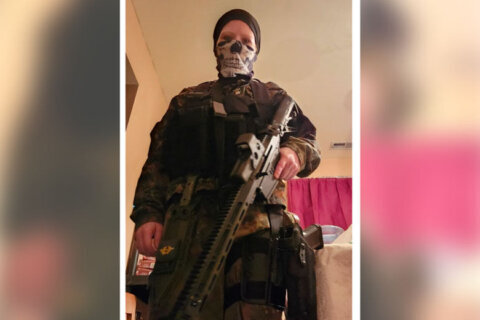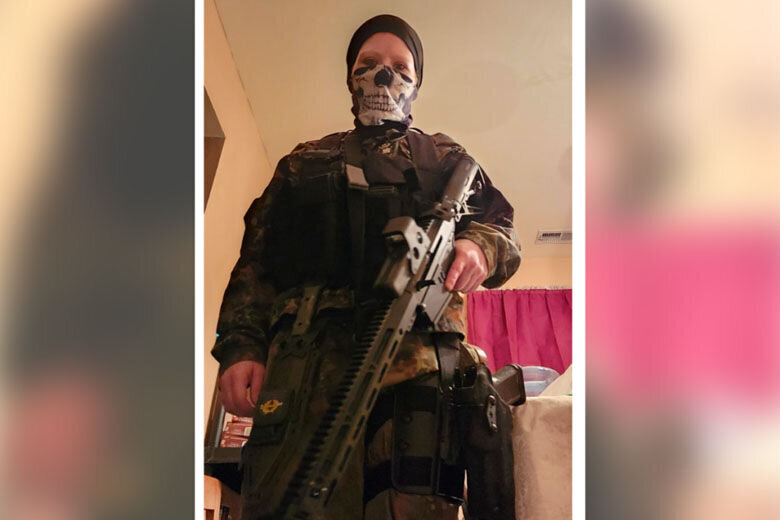
BALTIMORE (AP) — A Maryland woman who’s held white supremacist views for decades and recently conspired with a neo-Nazi leader to plan an attack on Baltimore’s power grid was sentenced Wednesday to 18 years in prison for her role in the plot.
The high-profile case ultimately came to focus on the defendant’s past trauma and her mental state as she struggled with addiction and embraced increasingly radical, racist views. Sarah Beth Clendaniel, 36, pleaded guilty to planning the attack in May.
Clendaniel was working with Brandon Russell, who co-founded a small, Florida-based neo-Nazi group, to plan a series of “sniper attacks” on Maryland electrical substations that could have caused significant damage to the regional power grid. It was meant to create chaos in the majority-Black city, according to federal prosecutors.
“It’s true, your honor, I do still hold National Socialist beliefs,” Clendaniel told the judge during her sentencing hearing Wednesday in Baltimore federal court, saying she adopted the ideology at age 13. She pledged to never again act on those beliefs.
“I know there’s a line there that I can’t cross,” she said.
U.S. District Judge James Bredar said he wanted to believe that Clendaniel wouldn’t have actually carried out the plot, which he called “extreme in every respect.”
“I think that’s a huge question, but who can take that risk?” he said, before sentencing her to 18 years in federal prison — the sentence prosecutors had recommended — and lifetime supervision upon release.
In explaining his decision, Bredar noted new information from prosecutors that Clendaniel had recently been placing jail calls to a white supremacist leader in California. Those calls show Clendaniel was unrepentant and undeterred, prosecutors said.
“This is something that is very much a part of her,” Assistant U.S. Attorney Kathleen O’Connell Gavin said during the hearing.
Clendaniel was charged last year along with Russell, a Florida resident who co-founded the group Atomwaffen Division. His case hasn’t gone to trial yet. Russell previously served five years in prison after pleading guilty to explosives charges that stemmed from a deadly shooting at an apartment that he shared with Atomwaffen’s other founder.
Clendaniel and Russell began exchanging letters around 2018 while they were incarcerated in different facilities. They developed a romantic relationship that continued after they were released from prison, court records show.
Clendaniel pleaded guilty in May to two counts: conspiracy to damage electrical facilities and being a felon in possession of a firearm.
Much of Clendaniel’s sentencing hearing focused on how her life may have been shaped by the severe domestic abuse and neglect she endured as a child and teenager. She spent some of her childhood living on the streets, and her struggles with addiction started at an early age, according to court testimony.
Those experiences made her acutely vulnerable to the influence of people like Russell and other white supremacist leaders, her public defender Sedira Banan argued. But Clendaniel had spent decades harboring racist views without ever acting on them.
“It’s a lot of talk,” Banan said, asking the court to impose a 10-year sentence. “That’s what it amounts to.”
In a letter to the court before sentencing, Clendaniel apologized for her actions and said she had been struggling with severe mental and physical health problems at the time, including a diagnosis of kidney failure. Believing her days were numbered, Clendaniel said she was in “a very dark place.” She said she was struggling to get her life on track and provide for her children after coming home from prison.
“I felt like I needed to do something to make up for my shameful life of drugs, crime, addiction, and neglect of my children by going to prison,” she wrote. “My primary motivation for my plans … was because I wanted to help people to understand how fragile this modern world is.”
Clendaniel grew up in rural Cecil County, an overwhelmingly white, conservative enclave in the northeast corner of Maryland bordering both Delaware and Pennsylvania. Her criminal history includes a series of robberies she committed while using drugs, often targeting convenience stores in her hometown.
She was serving a sentence for a 2016 robbery when she began corresponding with Russell.
After being released from prison in 2020, she fell back into familiar patterns of addiction and embraced increasingly radical views, court records show. She spent hours on the phone with a confidential informant she met through Russell, discussing how she would obtain a gun and shoot at five electrical substations situated in a ring around Baltimore, according to prosecutors. She was arrested and charged in the power grid plot in February 2023.
Copyright © 2025 The Associated Press. All rights reserved. This material may not be published, broadcast, written or redistributed.








